- Home
- Studs Terkel
The Studs Terkel Reader_My American Century
The Studs Terkel Reader_My American Century Read online
Table of Contents
OTHER BOOKS BY STUDS TERKEL
Title Page
Dedication
Preface
Foreword
Introduction
NOTE
Part I - The Dream
American Dreams : - Lost and Found (1980)
INTRODUCTION
VINE DELORIA
ANDY JOHNSON
WALLACE RASMUSSEN
VERNON JARRETT
C. P. ELLIS
LEONEL I. CASTILLO
Hard Times: - An Oral History of the great Depression (1970)
INTRODUCTION: A PERSONAL MEMOIR - (AND PARENTHETICAL COMMENT)
ED PAULSEN
ARTHUR A. ROBERTSON
CLIFFORD BURKE
DOC GRAHAM
OSCAR HELINE
JANE YODER
TOM YODER, JANE’S SON
JEROME ZERBE
PEGGY TERRY AND HER MOTHER, MARY OWSLEY
We Still See Their Faces
AN INTRODUCTION TO THE 50TH ANNIVERSARY EDITION OF THE GRAPES OF WRATH
“The Good War”: - An Oral History of World War Two (1984)
INTRODUCTION
ROBERT RASMUS
PEGGY TERRY
E. B. (SLEDGEHAMMER) SLEDGE
PETER OTA
BETTY BASYE HUTCHINSON
Part II - The City
Division Street: (1967)
INTRODUCTION
FLORENCE SCALA
DENNIS HART
LUCY JEFFERSON
KID PHARAOH
TOM KEARNEY
CHESTER KOLAR
GEORGE MALLEY (A.K.A. HENRY LORENZ)
EVA BARNES
Working: - People Talk About What They Do All Day and How They Feel About What ...
INTRODUCTION
MIKE LEFEVRE
DOLORES DANTE
ROBERTO ACUNA
ERIC NESTERENKO
PHIL STALLINGS
TOM PATRICK
Part III - The Divide
The Great Divide - (1988)
INTRODUCTION
CARROLL NEARMYER
REX WINSHIP
SAM TALBERT
LARRY HEINEMANN
JEAN GUMP
Race: - How Blacks and Whites Think and Feel About the American Obsession (1992)
INTRODUCTION
JOSEPH LATTIMORE
DIANE ROMANO
LLOYD KING
Coming of Age: - The Story of Our Century By Those Who Have Lived It (1995)
INTRODUCTION
BESSIE DOENGES, 93
JACK CULBERG, 79
GENORA JOHNSON DOLLINGER, 80
JACOB LAWRENCE, 76
DAVID BROWER, 79
Also by Studs Terkel
Copyright Page
r The Studs Terkel Reader collects the best interviews from eight of Terkel’s classic oral histories together with his wonderful original introductions to each book. Featuring selections from American Dreams, Coming of Age, Division Street, “The Good War”, The Great Divide, Hard Times, Race, and Working, this “greatest hits” volume is a treasury of Terkel’s most memorable subjects that will delight his many lifelong fans and provide a perfect introduction for those who have not yet experienced the joy of reading Studs Terkel.
Winner of the Pulitzer Prize and a member of the Academy of Arts and Sciences, Studs Terkel is the author of twelve books of oral history (most of which are available from The New Press). He is a recipient of a Presidential National Humanities Medal, the National Book Foundation Medal for Distinguished Contribution to American Letters, a George Polk Career Award, and the National Book Critics Circle Ivan Sandrof Lifetime Achievement Award.
OTHER BOOKS BY STUDS TERKEL
American Dreams
Lost and Found
And They All Sang
Adventures of an Eclectic Disc Jockey
Coming of Age
Growing Up in the Twentieth Century
Division Street
America
Giants of Jazz
“The Good War”
An Oral History of World War II
Hard Times
An Oral History of the Great Depression
Hope Dies Last
Keeping the Faith in Troubled Times
My American Century
Race
How Blacks and Whites Think and Feel
About the American Obsession
The Spectator
Talk About Movies and Plays
with the People Who Make Them
Talking to Myself
A Memoir of My Times
Will the Circle Be Unbroken?
Reflections on Death, Rebirth, and Hunger for a Faith
Working
People Talk About What They Do All Day and
How They Feel About What They Do
to
ANDRE SCHIFFRIN
editor and publisher
In memory, we find the most complete release from the narrowness of presented time and place.... The picture is one of human beings confronted by a world in which they can be masters only as they discover ways of escape from the complete sway of immediate circumstances.
—F.C. BARTLETT, Remembering
PREFACE
Studs Terkel’s accomplishments as America’s preeminent listener are all the more remarkable when you consider the fact that he happens to be a prodigious talker. He is, in other words, a monument to restraint. A couple of times, I’ve reversed roles with Studs—I’ve interviewed him for an hour on stage—and each time I was tempted to ask him one question, take off my lapel-microphone, and join the audience. He could have easily held the audience for a one-hour answer that ranged from his thoughts on jazz to his soap-opera career playing gangsters to the dinner-table conversations at the men’s hotel his mother ran to his antic experiences with the blacklist to the happy times in his favorite Chicago saloon, Ricardo’s, where one of the waiters was cued to stroll over to the table and join him in the Spanish Civil War song “Los Cuatros Generales.” Once Studs got on his roll, in fact, he might not have even noticed that I was missing.
One of those stage interviews was in San Francisco and one in New York, but wherever Studs is he brings Chicago with him. In the early days of cable television—when there were no cable listings in the newspapers and the most talked about show on local cable in New York consisted of a man who walked around town asking women to show him their breasts and Chicago was not yet even wired for cable—Studs and I did a talk show called “Nightcap” for a channel that I think was a precursor of Arts & Entertainment. We sometimes referred to “Nightcap” as the only fully clothed show on cable T.V. In each program, we chatted with a panel of people who were distinguished in a particular art form—three divas, say, or three architects or three writers of science fiction—and what continued to amaze me was that Studs seemed to know nearly all of them. I concluded that illustrious visitors to Chicago were taken to see Studs in the way that illustrious visitors to Chicago were once given a tour of the stockyards. Once, somebody on the show mentioned Jane Austen, and I said, “If she ever went through Chicago, Studs knows her.”
In the years Studs did his interview show on the radio, authors, even some who were not particularly illustrious, were taken to see him when they got to Chicago on a book tour. If an author arrived toward the end of his tour, he was likely to have repeated phrases from his book so often that they were beginning to have a depressing similarity to the flight attendant’s announcement about seat backs and tray tables. Then Studs would open up a copy of the book, which had been heavily underlined with a broad black pen, and read a few
passages in that gravelly voice that somehow made the words sound fresh again. The author would find himself thinking, “Hey, that writing’s not half bad!” I once suggested that foundations that wanted to buck up American writers didn’t have to send them to villas in Italy. They could simply have the writers interviewed by Studs. You wouldn’t even have to air the results.
When I was the visiting author, Studs and I usually got into a taxi after the taping to go to lunch, and the driver almost invariably realized that he had one of Chicago’s iconic figures in the back seat. There usually followed a conversation in which Studs, through his questions, displayed a remarkable familiarity with the driver’s old neighborhood, whether the neighborhood was Back of the Yards or Nigeria. The almost instantaneous connection Studs made with the driver was always a reminder to me that this man, who had interviewed Leonard Bernstein and Bertrand Russell and Ralph Ellison and Zero Mostel and Margaret Meade, created his most enduring work by gathering the thoughts of ordinary people on their struggles and their daily labor and even their deaths. They shared those thoughts with him, I think, partly because they sensed that his curiosity and his generosity of spirit embraced everyone, without regard to rank or station. They recognized him as a monument to much more than simply restraint.
—CALVIN TRILLIN
[The following appeared in the original edition of this book, which was first published in 1997 under the title My American Century.]
FOREWORD
The title of this book tells of a happy convergence—a writing observer’s destiny to have lived in a nation whose recent fate has granted it a worldwide ascendancy. Studs Terkel was born during the early adolescence of this century, the second decade, when we emerged as a great power, the nation whose belated entrance into the First World War decisively hastened its conclusion. Thereafter, gradually (and reluctantly and even fearfully), America became first among nations, its economic and military potential a looming presence even in the 1930s, when (like other capitalist countries) it lay perilously wounded. But the Great Depression, here and abroad, ended with the Second World War—indeed, Hitler had shown the world in the middle 1930s what military preparedness can do for a stagnant, even prostrate economy: a huge shot in the arm. By the early 1940s, to quote President Roosevelt, the United States had become a great “arsenal of democracy”—millions of men and women, hitherto jobless or only marginally employed, now working full-time (often overtime) at a halfway decent wage.
Not that bliss had once and for all arrived in the lives of America’s working people. The Wagner Labor Relations Act, which had at last strengthened the right of labor unions to organize and bargain with employers, had been enacted only in the late 1930s; and even after the Second World War had ended, unions across the country would have to struggle long and hard on behalf of their members. But the country would not again in the twentieth century slip into the kind of major collapse experienced in the 1930s. For decades, from 1950 to the late 1980s, we fought another kind of war, called cold—funneling billions of dollars into the defense industry and, as a consequence, providing a continuing stimulus to our industrial life. Still, for many millions of our people (for the substantial majority, actually), a reasonably stable economy has meant no end to worries about work and wages. Today, most of our citizens are barely able to stay ahead of their various creditors and, of course and alas, can all too easily lose their jobs and thereby the everyday sense of self-respect that goes with having a paycheck to cash or deposit every week. Such a vulnerability informs the life of even those lucky to be hard at work, as anyone interested in talking with ordinary working people will soon enough learn. But precisely who has had such an interest? To be sure, some earnest, determined journalists have insisted on talking with factory workers or office workers and have reported on what they saw or heard. Certain social scientists have likewise tried to understand how our “common folk” have managed—and done so not through distanced conceptual assertion but through fieldwork, efforts to learn firsthand from artisans or farmhands, from those who wear blue collars or white collars, how their lives go, how they manage (against what odds) in the course of their daily lives. Yet, anthropologists, as Margaret Mead long ago lamented, avoid their native lands in favor of natives in distant continents; and sociologists increasingly rely upon survey research, quantitative data enabled by the increasingly intricate technology of computers, and so cannot be counted on for individual interviews of any length and depth with particular men and women.
How lucky, then, for all of us, that Studs Terkel has been with us these many years. He has sought us out, sat with us, posed questions to us, wondered about us, asked of us what we have to say, got it all down on his tape recorder. Thereupon, he has returned to his own workplace (after visiting us in ours or in our homes) so that he can hear us yet again, consider what we have said, sift and sort those many words and sentences, and finally, give his own editor’s shaping sense to our statements, which, in turn, have become available to any of us fortunate enough to be his readers and really, thereby, his students. We learn through his work about our fellow Americans, how their various lives go, depending on who it is (living where, doing what) Mr. Terkel has managed to get to know.
This kind of person-to-person acquaintance becomes over time (as a consequence of keen listening, questioning, sharply sensitive editing) a form of idiosyncratic social inquiry, but not of a kind that is without precedent. Now in his eighties, Terkel graces us in these pages with a look back at his serious and important interviewing initiatives, his stories of lives, his oral histories, his attempts to understand abstractions such as “race” or “class” or “old age” through the personal accounts of his fellow twentieth-century citizens. We can perhaps best honor him not only by reading and rereading his books (or, if we live within listening distance of his Chicago radio program), by tuning in to his interviews, his music, his lively, original-minded, pointed comments, but also by trying to place him in a cultural and intellectual tradition. He has demonstrated an extraordinary capacity to place us, as it were, to help us locate where we are in our country’s (social, economic, political, racial) scheme of things, and of course, to take a particular place, such as Division Street in the Chicago he knows and loves so much and explore it mightily, find in it (to call upon the words of the Book of Common Prayer) “all sorts and conditions” of people, who become, finally, a lively and instructive cast of characters in a closely observed drama whose action a talented playwright (let us now call him, one of many roles he brilliantly manages) has chosen to evoke. Yet, as the psychoanalyst and historian Erik H. Erikson once reminded the participants in a seminar of his, “even the most creative among the gifted, even a genius, has ancestors and antecedents, both.” He was talking to us about Freud, but he was urging on each of us in the seminar, because of one or another biographical interest, a careful, considered examination of who and what preceded the person and time we were studying.
In that historical spirit, one seeks a home even for this exceptionally talented person, Studs Terkel, whose singularity of imagination and mode of work and manner of being are evident and impressive. Over 150 years ago, actually, Ralph Waldo Emerson was encouraging his listeners and readers to turn their backs on Europe, not in envy or an ignorant refusal of erudition and sophistication, but out of a necessary self-respect, a self-interest that would be a prelude, he knew, to a young nation’s growing achievement in the arts and letters. He dared take on university curricula that gave no regard to moral matters (“Character is higher than intellect”), and he spoke of “representative man,” an effort to look beyond the self-regarding, if not self-important, high-and-mighty ones in the academic and commercial worlds to whom, he knew, writers like himself can sometimes become almost beholden. He applauded Thoreau and Whitman, individuals who dared to go their own way and to give voice to ideas and values other than those favored by many professors or people of prosperity. Thoreau sought a humble life, one appreciatively tied to nature. Whitman
celebrated ordinary people, working hard to stay afloat, their expended energy, he knew, the mainstay of a nation’s daily life. He immersed himself eagerly in the rough-and-tumble of a country’s growing urban scene; took in its sights, smells, sounds without anxiety or fear; sang of sweat and brawn, of polyglot energy become a new kind of national community.
Not that certain nineteenth-century European writers were not also responsive to ordinary people, obscure and of modest means or quite impoverished, who lived in the countryside or the important cities of that powerful continent. Dickens had grown up poor, had even spent part of his childhood in debtor’s prison with his family, and for all his eventual prominence and success, would never turn his back on those who toiled hard to scrimp by. In novel after novel, he created characters meant to stay with us, teach us how it goes for those who do work different from that done by many of us who read his books. Zola in France and Dostoyevsky and Chekhov in Russia tried to evoke with sympathy and detailed care how people of humble circumstances managed to make do. Even Tolstoy, whose War and Peace and Anna Karenina mainly probed a world of wealth, of ballrooms and country estates, turned his back on all that during his well-known spiritual crisis in middle age and began to regard closely, respectfully, the way his own serfs lived and, too, those who shared their lives, the villagers whom heretofore he had ignored in favor of the nobility and the haute bourgeoisie. His moral fables, his tales of spiritual conflict, feature servants and agricultural workers and people barely getting by in out-of-the-way places—a big distance traveled from the czar’s entourage, residing in St. Petersburg or Moscow. This shift, so we learn in his Confession , was of enormous moral significance to him. He found in the poor a quiet, unassuming dignity earned daily through their hard labor; and he kept remembering, in that regard, the proclaimed righteousness of the Hebrew prophets and of Jesus, their insistent interest in “the last” rather than “the first,” and their wish, through parables, to remind us of moral virtues that can accompany a harsh, menial life.

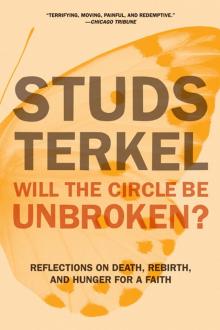 Will the Circle Be Unbroken?
Will the Circle Be Unbroken?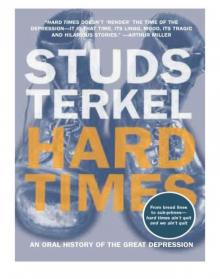 Hard Times
Hard Times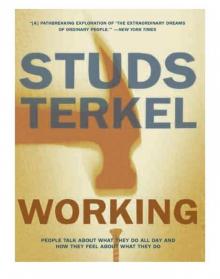 Working
Working Touch and Go
Touch and Go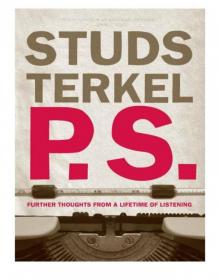 P.S.
P.S.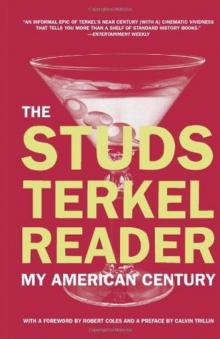 The Studs Terkel Reader_My American Century
The Studs Terkel Reader_My American Century